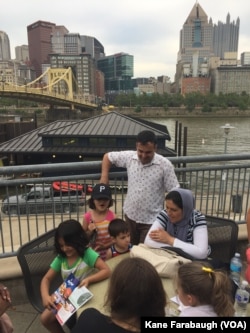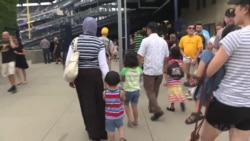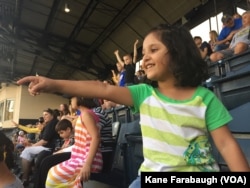M. Kazam Hashimi has experienced a series of firsts since leaving Afghanistan: his first American meal; his first American job; and now; his first American baseball game at the home of the Pittsburgh Pirates, PNC Park.
“First time ever for my family,” he told VOA in an interview at the stadium along the banks of the Allegheny River, one of three that give Pittsburgh its unique geographic identity. “In Afghanistan, people are a very big fan of soccer. They don’t know anything about the Pirates.”
Hashimi’s arrival at PNC Park is a welcome but unexpected part of a longer journey fleeing war in Afghanistan, where he worked as a translator for the U.S. Army… a job that became increasingly dangerous.
“So I quit working there in 2009,” he explains somberly, “because my family and I got threatened to death. So I had to quit, I had to leave.”
Special immigration visa
Granted a special immigration visa during the Obama administration, Hashimi and his family arrived in the U.S. in 2015. Although he spoke English, and had connections with former U.S. military members he served with in Afghanistan, Hashimi was a stranger in a strange land trying to understand a very different culture.
That’s when he received an email from a new nonprofit organization in Pittsburgh called “Hello Neighbor.”
“The email said you will get to meet new American families, you will understand American culture,” Hashimi said. “Basically everything about the United States, about the people. So I was very interested. My family as well.”
The first 90 days
The initial 90-day resettlement program for refugees in the United States is filled with activities and appointments that help them find a place to live, a place to work, and initial introductions to American culture. But integration into life in America extends well beyond 90 days, something Pittsburgh native Sloane Davidson realized when she set out to create the “Hello Neighbor” program matching refugee and immigrant families with American mentors in the city.
'Hello Neighbor' Builds Cultural Bridges for Refugees in Pittsburgh
“If you think about the first 90 days you’ve done anything — a new job, a new relationship, a new city — it’s a whirlwind,” she said. “When those three months are over, a lot of the traditional support that we give people who are new to this country under refugee status goes away. And the goal for them is to be self sufficient.”
The larger Pittsburgh area has one of the smallest percentages of foreign-born residents in the U.S., and the Jewish Family & Children’s Service of Pittsburgh reports resettlement agencies now place roughly 500 refugees in the city each year. With additional secondary migrants, about 8,000 refugees have arrived in Pittsburgh in the last five years, many of them from Bhutan, Burma, Somalia and Iraq.
As Davidson researched support systems in place, she learned that there wasn’t much to help them beyond the 90-day State Department resettlement program. She also learned there were Americans looking for ways to get involved helping newly arrived refugees, but no way to connect with them.
“You had refugees and immigrants who typically didn’t have any American friends because their lives are very isolated,” she said. Along with the isolation, Davidson added, were increased challenges adapting to the new environment.
“Language and transportation are an issue,” she said. “And I really thought about how these two groups could come together and have meaningful interactions.”
Building bridges, making friends
So she began hosting events like museum tours, picnics and library visits, pairing refugee families with American mentors like Michelle Boehm.
“I think it’s vital,” Boehm said. “I think we need to introduce these people into our culture. I think we need to accept them with open arms and help them integrate.”
Taking in “America’s Favorite Pastime” isn’t just a first for the Hashimis. Davidson says Hello Neighbor’s Refugee and Immigrant Night at PNC Park is also a first for the Pittsburgh Pirates baseball organization, a welcome development in a city she hopes will be more inviting.
“Here in Pittsburgh, we talk about being a city of bridges, and how we build bridges,” she said. “And that mentality should extend, but doesn’t always, to the new wave of refugees and immigrants coming in.”
Michelle Boehm says her family has integrated so well with the Hashimis they are more than mentors … they are friends.
“Their kids are 6, 5 and 3, and mine are 6 and 2,” she told VOA. “So it wound up being perfect as far as the age ranges go, and they love hanging out.”
Thanks to Hello Neighbor, the city of Pittsburgh has built a bridge into Kazam Hashimi’s heart.
“City of Bridges. I love it … it is very friendly,” he said, smiling under his new Pittsburgh Pirates baseball cap.
Program grows
Right now Davidson says there are about 25 refugee families paired with 25 families in Pittsburgh, and that number is growing thanks to encouraging responses by the community to events like the one at PNC Park, which also helps draw in new volunteers.
The growing success of the Hello Neighbor program could soon build bridges beyond the Steel City, and may also help the Hashimis mark another first — the first participants in a wider “Hello Neighbor” movement.
“I’m getting emails every day saying can you bring this to Seattle, to Columbus, to Boston, to Hudson Valley, to Indianapolis, to Detroit,” Sloane Davidson told VOA. “I had a mayors office in the Midwest email me and say we want to do something like this, can you help us set it up?”
Davidson is happy to know the idea is catching on, and is encouraged by the growing support for the program locally, which includes a recent $130,000 joint commitment from The Heinz Endowments and the USA for UNHCR to fund the program in Pittsburgh.










